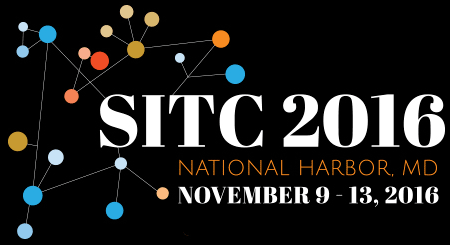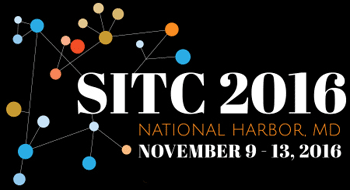Cancer Immunotherapy Trials Network (CITN): Ten Trials with High Priority Agents
In line with its goal to lead the design and conduct of cancer immunotherapy trials to expedite the approval of promising agents, the CITN presented a brief 25-minute overview of ten key clinical trials investigating high-priority immunotherapy agents.
High priority agents: anti-PD-1, agonist anti-CD40, and IL-15
Leading this session, Jeffrey Miller, MD (University of Minnesota) presented a phase II study of pembrolizumab (2 mg/kg) in unresectable, recurrent advanced Merkel cell carcinoma (n = 26; NCT02267603). The response rate of 56% observed in this study was the highest response rate for an anti-PD-1 agent in any solid tumor to date. Moreover, these responses were durable (7.6 month median follow-up) in 86% (12/14) of responders. Based on these results, pembrolizumab is becoming a preferred therapy in this setting. Further illustrating the broad application of anti-PD-1 agents, Dr. Miller discussed a phase II trial of pembrolizumab in 24 patients with relapsed or refractory stage IB-IVB mycosis fungoides or Sézary syndrome (NCT02243579). Preliminary results illustrated that pembrolizumab was well tolerated and showed signs of efficacy with durable response (8/9 currently ongoing). Concluding the focus on anti-PD-1 trials, Dr. Miller presented results from a phase I study of pembrolizumab in HIV-positive patients with relapsed/refractory malignancies, which to supported inclusion of HIV-positive patients in anti-PD-1 therapy trials (NCT02595866). The next trial presented was a newly opened phase I study of neoadjuvant CD40 agonist alone or in combination with chemotherapy in patients with recently diagnosed resectable pancreatic carcinoma, with data forthcoming (NCT02588443). Finally, Dr. Miller presented a phase I dose escalation study of subcutaneous recombinant IL-15 (0.25, 0.5, 1.0, 2.0, and 3.0 mcg/kg) in advanced solid tumors including melanoma, kidney cancer, non-small cell lung cancer, and squamous cell head and neck cancer (NCT01727076). Overall, IL-15 was well tolerated and flow cytometry data illustrated an increase in circulating NK cells as well as CD8+ T cells, warranting further study of this agent particularly in combination approaches.
A phase II study of recombinant glycosylated human interleukin-7 (CYT107) after sipuleucel-T for patients with asymptomatic or minimally symptomatic metastatic castration-resistance prostate cancer (mCRPC)
Sipuleucel-T, a personalized cell-based cancer vaccine for the treatment of prostate cancer, functions by recruiting T cells to the tumor site. Presented by Lawrence Fong, MD (University of California San Francisco), studies of the T cell repertoire revealed that sipuleucel-T also increases the diversity of T cell clones in the prostate gland and can be detected in the periphery. This discovery led to an ongoing multi-institution trial (NCT01881867), which aims to further augment the immune response by administering sipuleucel-T in combination with subcutaneous IL-7 as a lymphocyte growth factor. Although a number of injection site reactions were reported, this combination therapy was generally well tolerated. In comparison to sipuleucel-T monotherapy, the combination decreased the neutrophil/lymphocyte ratio in circulation, suggesting that IL-7 may contribute to a greater expansion of lymphocytes. Future analyses will include aspects of prostate antigen-specific T cells as an endpoint.
A pilot study of the immunological effects of neoadjuvant INCB024360 in patients with epithelial ovarian, fallopian tube or primary peritoneal carcinoma
Kunle Odunsi, MD, PhD (Roswell Park Cancer Institute Center for Immunotherapy) discussed a study (NCT02042430) that sought to understand how inhibition of indoleamine 2,3-dioxygenase (IDO)-1 via oral INCB024360 affects the tumor microenvironment (TME). The primary objective of this phase 0 window of opportunity trial in patients with primarily stage III disease was to assess the extent of tumor infiltrating immune cells. A reduction in the ratio of kynurenine:tryptophan as a readout of IDO1 activity was noted in ascites 5/11 (45%) and plasma 8/11 (73%) from patients with evaluable biopsies, indicating INCB024360 activity in the TME. Toward the primary objective, 8/11 (73%) patients had an increase in CD8+ T cell tumor infiltrate; a shift in the interferon signature, along with increases in genes associated with NK cells and the Th1 subset, were also observed. Future studies aim to evaluate responses to tumor antigens and T cell clonality following treatment with this IDO1 inhibitor.
Increased immune responses in melanoma patients pre-treated with CDX-301, a recombinant human Flt3 ligand, prior to vaccination with CDX-1401, a dendritic cell targeting NY-ESO-1 vaccine, in a phase II study
Steven Fling, PhD (Fred Hutchinson Cancer Research Center) presented data from a phase II randomized multi-center trial in which investigators sought to increase the immune response in patients with stage IIb-IV melanoma by therapeutically targeting dendritic cells (DC) (NCT02129075). Specifically, the study examined the effect of pre-treatment with the Flt3 ligand CDX-301 to mobilize dendritic cells (DC) prior to vaccination with a fusion protein (CDX-1401). CDX-1401 is comprised of an antibody specific for DEC205 and the immunogenic tumor antigen, NY-ESO-1, given concurrently with the TLR3 agonist poly ICLC. The addition of CDX-301 resulted in an increase in innate immune cells as well as significantly higher anti-NY-ESO-1 antibody titers and rapid NY-ESO-1-specific T cell responses. Evidence of epitope spreading was not apparent with or without CDX-301 treatment. The combination of CDX-301, CDX-1401, and poly ICLC was well-tolerated with no adverse events requiring discontinuation of treatment. Correlative studies are currently underway to examine phenotypic and functional characteristics of infiltrating immune cells.





Important Dates
Regular Abstracts Published in JITC
November 8, 2016
Late-Breaking Abstracts Published in JITC
December 8, 2016
Thank You, Supporters!
Thank you, SITC 2016 supporters. Because of your generosity, SITC 2016 was a great success!
Interested in supporting other SITC programs? Confirm your support today!


Connect with SITC!